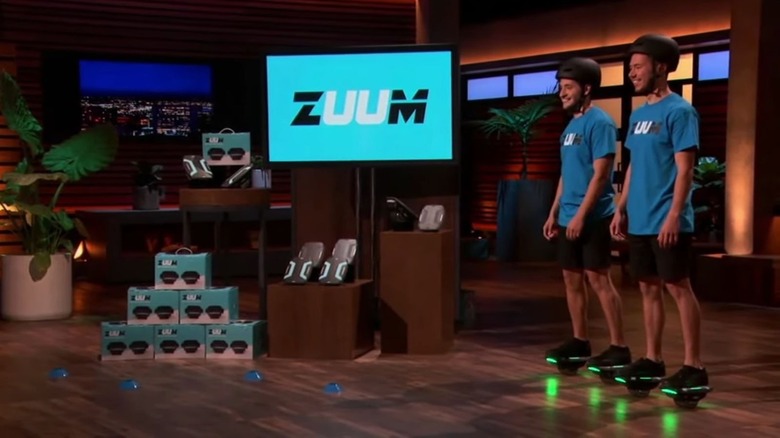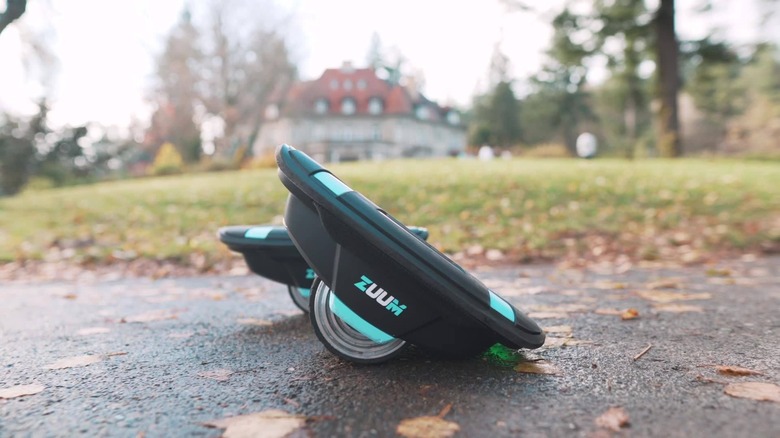What Happened To ZUUM Hover Shoes From Shark Tank Season 11?
Chico Guerra and Mason Buechler appeared on "Shark Tank" in January 2020 (Season 11 Episode 10). As founders of ZUUM Technologies, they hoped at least one of the sharks would be enticed enough to bite into their individual self-balancing platform shoes.
When the pair rolled into the studio riding their E-Skates, Robert Herjavec became immediately stoked. In fact, he strapped on a helmet and gave them a little test ride. All went well ... until he had to stop, which ended with him jumping off at the last second, nearly ending up in the laps of the other sharks.
Guerra and Buechler are genuinely lifelong friends, having known each other since third grade, growing up just five houses away from each other. During the course of their friendship, they realized they both had a passion for business. After Guerra graduated from Corban University in May 2017, the duo created ZUUM Technologies in an effort to tap into the burgeoning personal electrical vehicle trend that encompassed skateboards, hoverboards, and shoe skates. So what happened to them and their invention?
Beware of the shark's bite
First, let's have a little recap of their journey through "Shark Tank." During the pitch, Guerra claimed the shoes had a top speed of 8mph with an average ride time of one hour. The original sale price was $299, and they were seeking $125,000 for a 20% stake in the company to custom design their product.
In 2020, the global hoverboard market was valued at $734.5 million and was expected to hit $1.3 billion by 2030. Furthermore, it was expected to grow by $268.68 million between 2020-2024, so it definitely made for a market segment worthy of investment.
However, during the Q&A session, the sharks discovered ZUUM would merely be a distributor of an already manufactured product from China. There was nothing proprietary about their product, and they neither owned the technology nor had exclusive rights to distribute that technology in the United States.
Mark Cuban bailed out first, because they couldn't tell him how they would be different from someone else selling a product with the same technology. When Barbara Corcoran asked them what their biggest obstacle was, they said money, and she told them they lacked the passion and ended up turning them down. The other three sharks were even harder on the ZUUM duo, with Kevin O'Leary actually saying their whole pitch sucked, and he hated it. Thus, no sharks found ZUUM's bait enticing enough to invest.
Improvise. Adapt. Overcome
It's not like Guerra and Buechler came in without any previous funds, though. A year before, in January 2019, they started a Kickstarter campaign that landed them 65 backers putting up $24,253. Later that year, in April, they fired up a different crowd-sourcing campaign on IndieGoGo, earning 69 more backers with another $26,149. They used this money to get the ball, or the shoe, rolling.
With no additional seed money from the sharks, not to mention the harsh comments regarding their business model, one would think ZUUM folded. They did not. Instead, they persevered and adapted. Today, they continue to take orders via their website, although not without hiccups. They initially sold on Amazon, but because they didn't have exclusive rights to the technology were soon competing with other companies selling virtually the same product.
Thankfully, today's version has improved, increasing rider capacity from 220 to 300 pounds. Depending on various factors (i.e., weight, speed, terrain), fully charged ZUUMs can last 1.5 to 2 hours with a range of 3 – 7 miles. They can recharge in two hours, and while they still only have a top speed of 8mph, these skates are powered by a "patented" 350-watt brushless dual-motor that can propel someone up hills with a 15% grade, which is technically considered a "steep grade."
Even better, the compact "Tesla of electric skates" has since dropped from the original asking price of $299 down to $250.

